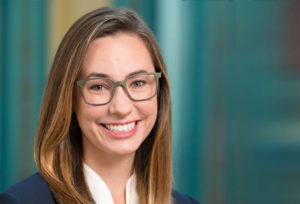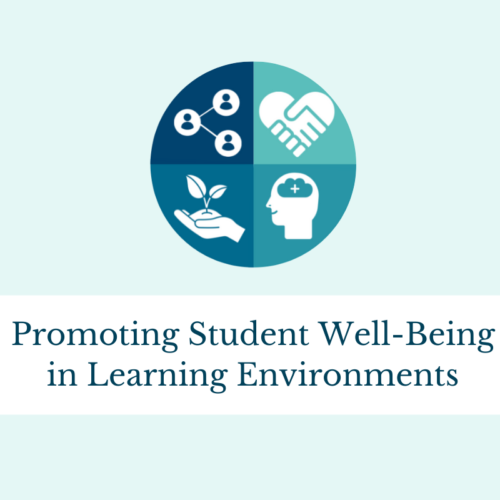Faculty Spotlight with Ashley Hardin, Assistant Professor of Organizational Behavior, Olin Business School
 “I hope that students see their world differently and realize that they can be proactive in shaping their experiences in organizations—influencing team culture and asking for feedback,” said Ashley Hardin, Assistant Professor of Organizational Behavior at Olin Business School at Washington University in St. Louis. Professor Hardin teaches courses including “Organizational Behavior within the Firm,” an undergraduate core course, and “Introduction to Organizational Field Research,” a PhD required course.
“I hope that students see their world differently and realize that they can be proactive in shaping their experiences in organizations—influencing team culture and asking for feedback,” said Ashley Hardin, Assistant Professor of Organizational Behavior at Olin Business School at Washington University in St. Louis. Professor Hardin teaches courses including “Organizational Behavior within the Firm,” an undergraduate core course, and “Introduction to Organizational Field Research,” a PhD required course.
Professor Hardin earned a PhD in Business Administration (Management and Organizations) from the University of Michigan’s Stephen M. Ross School of Business. Her dissertation was entitled “Getting Acquainted: How Knowing About Colleagues’ Personal Lives Impacts Workplace Interactions, for Better and Worse.” During her time at the University of Michigan, Professor Hardin worked as a doctoral research fellow at the Center for Positive Organizations.
Prior to pursuing her PhD, Professor Hardin worked as a Senior Associate Consultant for Bain & Company and the Bridgespan Group.
In 2020, Professor Hardin was an honoree of the Emerson Excellence in Teaching Award, which recognizes educators for their leadership in and passion for teaching, their contributions to student learning, and their knowledge and creativity.
In an interview with The Center for Teaching and Learning, Professor Hardin discussed how her professional experience has impacted her work in the classroom. She also emphasized the importance of flexible teaching during the pandemic.
What was your path toward becoming a professor of Organizational Behavior?
My path to becoming a professor was a bit of a winding road. I studied finance and mathematics in undergrad before becoming a strategy consultant. While working, I realized that my passion really centered on understanding the human element in the room—why people were interacting in particular ways. This inspired me to research new career paths that would more directly incorporate this interest, which resulted in my discovery of Organizational Behavior research. To pursue this, I went back to school to obtain my PhD in Organizational Behavior, prior to joining WashU as an Assistant Professor.
What are some of the challenges of teaching business courses, and how do you address them?
Often with undergraduate business education, students want to focus on the hard skills: finance, accounting, economics. I understand this inclination, as I also felt this way prior to my first full time job. My goal in the classroom is to give students hands-on experience to understand the importance of developing skills that will enable them to be a positive force for their work teams.
What is your favorite part (or parts) of teaching Organizational Behavior?
My favorite part of teaching OB is how applicable it is, regardless of chosen career path. By challenging students to use course concepts to understand their groups for class, their student organizations, internships, or past full-time jobs, they are able to immediately apply class content and experiment with new ways of approaching the world.
How have you adapted your teaching during the pandemic? What advice do you have for other instructors teaching during this challenging time?
Teaching during the pandemic has been a challenge; my course is grounded in class activities and discussions, which needed to be revamped for a Hybrid environment. Though I thought this could detract from the student experience, I found it also provided opportunities for me to try new ways of teaching familiar material. There were definitely hiccups along to the way, but students seemed to appreciate that I was trying to utilize the technology and attempt new things. My advice is to be open with the students – when a new approach doesn’t quite work out, admit that to them, ask them for feedback, and adapt next time!
How has your professional experience influenced you as an instructor?
My professional experience provided a foundational understanding of business operations across many industries and functional areas. This provides me the ability to draw on these experiences to relate to student interests through class examples. When teaching a concept, I can give case examples, but also examples from my own experience which helps to bring more richness to the lesson.
What do you hope students take away from your classes?
I hope that they see their world differently and realize that they can be proactive in shaping their experiences in organizations—influencing team culture and asking for feedback.
What advice do you have for aspiring instructors?
In the classroom, try to keep an experimental spirit. Not every lesson will land the first time it is taught. Take notes about what seemed to resonate, keep those elements, but try out a different way of communicating (e.g., activities, cases, discussion questions) the next time you teach it.



